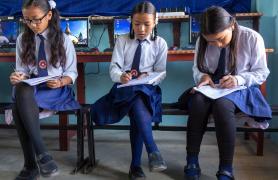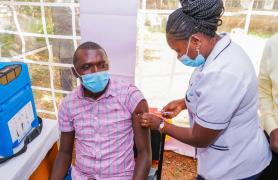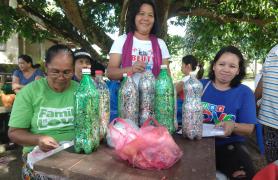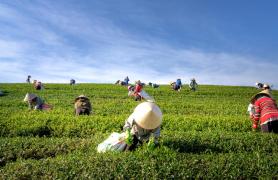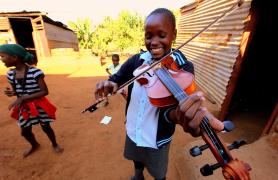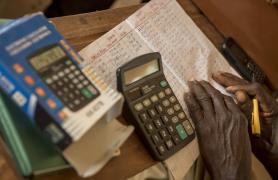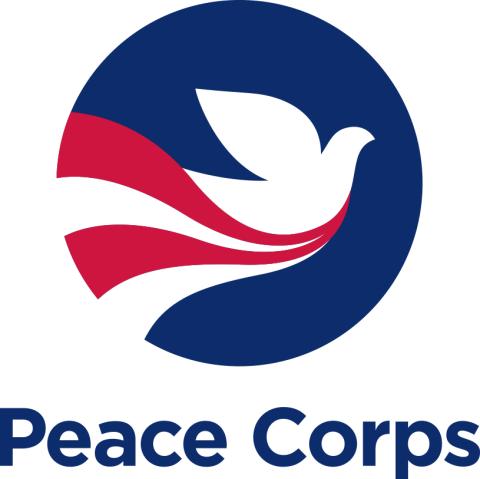
The Peace Corps Prep Program (PCP) assists you in building the skills and insights you need to have a positive impact as a Peace Corps Volunteer or in community transformation and humanitarian aid. The program centers on one empowering question: “How can you prepare yourself to be the best Peace Corps Volunteer you can be?” The Peace Corps Prep Program is extremely flexible and allows you to pursue interests and passions from a wide variety of areas and offers a competitive edge when applying to the Peace Corps. Upon completion of the program, participants receive a certificate from the Peace Corps and CSI. Check out this PCP Step-by-Step video.
Upcoming Events Peace Corps Prep Virtual Info Session
Contact Information
PC Prep Program Coordinator
Learn more about the CSI Peace Corps Prep Program and how to earn your Certificate below:
What are the general requirements to complete the PCP Certificate Program at CSI?
Congratulations on taking the first step toward learning more about the Peace Corps Prep program at CSI. This program will prepare you for international development fieldwork and potential Peace Corps service.
To accomplish this, you’ll build four core competencies through interrelated coursework, hands-on experience, and professional development support. These four competencies are:
- Training and experience in a work sector
- Foreign language skills
- Intercultural competence
- Professional and leadership development
The Peace Corps Prep Student Guide explains each of these requirements in detail. You can use guide to map out your Peace Corps Prep course of study with your PC Prep advisor. In short, you will take a series of courses related to one of the Peace Corps Sectors and complete 50-hours of related field experience over your time in the program. The six Peace Corps sectors include Agriculture, Community Economic Development, Education, Environment, Health, and Youth in Development. Within each of these sectors there are many opportunities to explore within a diverse range of majors and areas of study.
Applying to CSI’s Peace Corps Prep Program
Ready? Applying to the Peace Corps Prep Program at CSI is easy!
- Complete the Interest Form, we will contact you to set up an advising session to help you get started or answer any questions.
- Meet with Winnie Brophy, the PCP Campus Coordinator to begin your journey.
Once you are in the Program:
- Meet regularly with your PCP Advisor and make progress on your PC Prep Program;
- Submit your Exit Checklist to your coordinator;
- Get your PCP certificate!
Why Join the Peace Corps?
Peace Corps service asks a lot of you. But it also has a lot to give. While you serve others, you will be gaining benefits that last through your volunteer service and well beyond.
- Career benefits - The Peace Corps provides rigorous technical training at the start of service, which includes in-depth intercultural and language instruction, usually from a native speaker.
- Financial benefits - The Peace Corps provides each Volunteer with housing and a living stipend that enables them to live in a manner similar to people in their community of service. Unlike other international volunteer programs, there is no charge to participate in the Peace Corps. Upon completion of two years of service, the Peace Corps provides each Volunteer with more than $10,000 to help with the transition to life back home.
- Student loan benefits - Student loans are your responsibility while you are in service, but certain public student loans may be eligible for deferment or for Public Service Loan Forgiveness by your lender.
- Travel benefits - The Peace Corps covers the cost of transportation to and from the country of service. Each Volunteer receives two paid vacation days per month of service, and many use this time to travel to nearby countries. Some invite family or friends to visit so they can share their experience of the host country.
- Medical and dental benefits - The Peace Corps provides medical and dental care that covers all related expenses during service, including preventative care, and issues incurred during your training period, service, or on vacation.
Throughout service, Volunteers have regular opportunities to gain new skills related to work, language, culture, and safety. This training makes returned Peace Corps Volunteers highly in demand by corporate, nonprofit, and government employers seeking candidates with the skills required in today’s global economy.
The Peace Corps offers career support specifically tailored to Volunteers when they return home to help them prepare for their next step:
- Help translating their field experience to prospective employers
- Advantages in federal employment and hiring benefits related to noncompetitive eligibility and possible credit toward retirement should they meet qualifications
- Access to job announcements, résumé services, and career fairs
- Other special eligibility for hiring preferences by organizations designated as Employers of National Service
Returned Peace Corps Volunteers have gone on to successful careers in all kinds of fields, from international development to business to the arts.
Want to learn more about how to apply to the Peace Corps? Watch this video to learn more about Applying to Peace Corps. (Time: 0.35)
What does the Peace Corps do?
* The Peace Corps is a catalyst for cultural exchange, powered by volunteers ready to support local efforts to reduce inequality and to create new opportunities.
* The Peace Corps is a service opportunity for motivated change makers to work side by side with local leaders of a community outside the U.S. to tackle the most pressing challenges identified by the community.
* The Peace Corps is an independent agency and volunteer program run by the United States Government and was established by Executive Order 10924 issued by President John F. Kennedy in March 1961.
Returned Peace Corps Volunteer Stories
- Jenny Pisani, CSI Alumni, Peace Corps Volunteer (2015-2017), Cambodia
- Deborah Stengle, former CSI staff, Peace Corps Volunteer (2000-2002), Lithuania
- David Allen, CSI faculty, School of Education, Peace Corps Volunteer (1990-1992), Poland
Jenny Pisani, CSI Alumni, Peace Corps Volunteer (2015-2017), Cambodia
“This was just an idea in my head and now you have made it bigger than I ever imagined,” I said to the school director of the high school where I taught during my Peace Corps service in Cambodia. I was about to leave the country in less than a week -- after living there for four years -- and had returned to the village to say my goodbyes at the school and to the garden I helped grow.
The director, Khuth Chanthy, and I reminisced as 9th grade students watered the newly planted cucumber seeds for this year’s garden. The garden had grown so much since our initial project.
In 2016 Thea Prang, an English teacher at Ang Roka High School in Takeo Province, Cambodia, and I decided we would be co-teachers. I had been placed at his school as a Peace Corps Volunteer, and was there for two years as an English teacher and a teacher trainer. We worked closely together as counterparts, and he was my trusted right-hand man.
In 2016 Thea Prang, an English teacher at Ang Roka High School in Takeo Province, Cambodia, and I decided we would be co-teachers. I had been placed at his school as a Peace Corps Volunteer and was there for two years as an English teacher and a teacher trainer. We worked closely together as counterparts, and he was my trusted right-hand man.
Thea Prang and I spoke a lot about community and how we could improve our school in a real
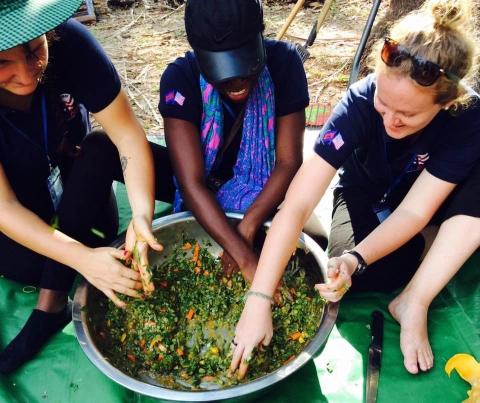
way. He was a father and worked multiple jobs, including growing and tending his own rice field for his family. We spoke about farming and gardening a lot.
It is part of Cambodian culture to eat food straight from the land, as fresh and as local as possible. Although there are plenty of vegetables available at neighborhood markets, Cambodians often are very wary of buying imported produce due to concerns about the effect of chemicals on their health. They prefer produce from their own ground or a nearby tree.
FRESH CANVAS
As an avid gardener back home in Staten Island, I saw the great expanse of land behind the high school as fresh canvas. After talking to the school director, we decided that Thea Prang and I would begin a small garden together. As a team, we went to a food security training with the Peace Corps and learned how to set up an organic school garden.
Thea Prang, barefoot with his jeans rolled up to his knees, was at my side as we learned how to compost and prepare organic pesticide from chilis and local resources. He was smiling and eager the whole time, and I knew I selected the right guy for the project.
When we came back from training, we got right into the dirt. It was a small project, and we had all the tools we needed, so there was no reason to wait for grants or funding. We had some shovels, and a small group of students helped us dig a few raised beds behind our school. Then we planted cucumber seeds that came from local farmers.
We also planted morning glory, or water spinach, a popular and delicious vegetable in Southeast Asia.
With a bit of planning, time, sunshine and water, eventually the seeds took root and grew vegetables! The students harvested the veggies and sold them for a profit for the school. Poor students were also allowed to take vegetables home to their families. All in all, our pilot school garden was a definite success, and now it was time to wait for the next season.
Cambodia has two basic seasons, wet and dry. Once dry season comes, and the crops are harvested, it becomes a waiting game for rain. So, I knew the garden would start again, but this time it would be without my hands because my service would end before the rain.
After my service, I worked in Cambodia in the capital city, Phnom Penh, and stayed in touch with my old high school. The school director continued to expand the garden, grow more local vegetables, and create more raised beds. The garden has expanded way beyond my initial vision, and is now thriving in a way I could not have imagined, all without my help.
It is amazing what an idea-seed can do when planted in the right ground, with the right hands, and the right amount of hope.
Jenny Pisani is a poet, educator and gardener from Staten Island. She returned home in June 2019 after living in Cambodia for four years and serving as a Peace Corps Volunteer from 2015 - 2017. After her service, Jenny worked as an English lecturer and was director of Foundation Year at the University of Puthisastra, a medical university in Phnom Penh, Cambodia.
She holds a Masters of Science in Secondary Education in English and a BA in Psychology and Creative writing from Macaulay Honors College of the College of Staten Island/CUNY. Jenny is a teaching artist with the Staten Island arts education nonprofit, IlluminArt, and a member of the Native Plant Society of Staten Island.
Deborah Stengle, former CSI staff, Peace Corps Volunteer (2000-2002), Lithuania
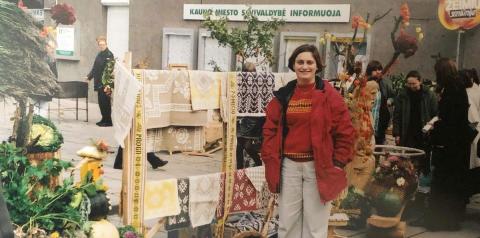
Peace Corps changed my life!
Becoming a volunteer had been my dream since a small child because my father has served as a volunteer in Borneo, Indonesia. I grew up watching film images from my father days as an English teacher in a remote village on a film projector every Christmas. I can remember saying from a young age I want to do that as soon as I was eligible for such an experience.
Being a volunteer was one of the greatest and most challenging times in my life. I served as an English Teacher in a High School in a small town called Trakai, Lithuania which was once the capital of Lithuania. The place is beautiful and not far from the now capital of Lithuania which is Vilnius. I became a volunteer to fulfill my love of travel, serving others, wanting to grow and do good while experiencing another culture for an extended period of time.
I think back to my time in Lithuania, and I learned so much about myself, about a beautiful country with a long and difficult history and meet so many amazing friends along the way. I am still in touch with some of my students that I taught and have met up with them around the world to connect even though it’s been 20 + years since I was a volunteer.
I learned a language that I never would have, I created experiences that taught me about leadership and serving my community, I brought people together in a community that may not have met through English teaching while exchanging ideas, information, and knowledge. I taught students who had never met a non-Lithuanian or heard English from a native speaker. I challenged my students to think broadly about their lives and tried to instill in them a sense of service to their peers and community and a general love for learning English.
Trakai was a tourist town sounded by lakes and farm which allowed for lots of town of exploring and learning about gardening and the joys of summer fires with the local dish of shishkabobs, and the winter months of hot saunas and jumping in the snow and little lakes to get clean. I got lucky with my site. There was so much opportunity to engage with the locals, speak and practice my proficiency of Lithuanian and enjoy living in a really magical place that I fell in love with.
Trakai was both worlds because it was small and with so much history but could access the big city close by if I wanted. I learned about the history of the Jews, Karaims, Tatars, Lithuanians, Russians, and Poles. I experienced host families taking me in and treating me as one of their own family members. Teaching and Education have always been a part of my professional, personal, and academic life. I feel that my own experience having to acclimate to a new culture helps now with my role as an international educator working both with US students going abroad and international student and scholars coming to the US.
I started as a volunteer thinking I was going to change the world, change the minds of the people that I taught and worked with. I probably did help some of my students and colleagues grow and expand their dreams and goals, but I think in the end I was changed forever. My experience helped shape my life as an international educator. It helps me to assist my students and scholars having memorable and life changing experiences in the US and abroad.
Deborah Stengle is the Associate Director for Foreign Student and Scholar Services, Center for Global Engagment at the College of Staten Island/CUNY.
David Allen, CSI faculty, School of Education, Peace Corps Volunteer (1990-1992), Poland
In June 1990, a few days after I finished teaching my last middle school English class of the year, I flew to Washington, DC, to join about 30 other Peace Corps volunteers heading to Poland with the first Peace Corps mission to Central Europe (Poland, Hungary, and Czechoslovakia). The Cold War had just ended, and these countries needed English teachers to help train a generation of students who would suddenly being taking English rather than Russian as a required subject in school.
We spent the summer in the historical city of Toruń, living with local host families, studying Polish, and learning about Polish culture. After this crash course, I was assigned to teach at a brand new teacher training college in Warsaw, the country’s capitol. For two years, I worked with Polish professors as well as other instructors from the United States and Canada preparing English teachers for the country's high schools. Our students were nervous and excited at the opportunity. Their country was changing rapidly to a more Western style democracy. I was even there for the opening of the first McDonalds in Poland.
I made close Polish friends, travelled throughout the country, as well as to Prague and Budapest, and struggled to learn the language (very challenging!). I also learned about Poland's difficulty history: being occupied during WW II, first by the Germans, then the Soviet Union, the Nazi's death camps where most of Poland's large prewar Jewish population were murdered, food shortages and lines for everyday goods, and the heroic struggle of Poland's workers and intellectuals during martial law in the 1980s (the Solidarity movement) that inspired changes in governments across Central Europe. During my time there, Poland had its first truly free elections.
I have often described my time with Peace Corps as the best teaching job I have had in a lifetime of teaching. I found that living and working in a different country and culture pushes you in ways that nothing else does. Give it a try!
- David Allen, RCPV, Poland 1990-92
Dr. David Allen is a Professor and Chairpersin, Department of Curriculum & Instruction at the School of Education, College of Staten Island/CUNY
